Memoir of Eric Francis Maher, 1945 - Part 2
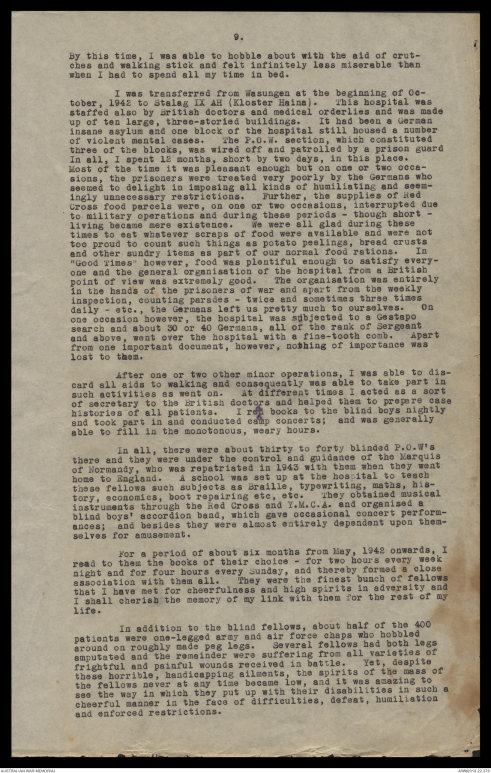
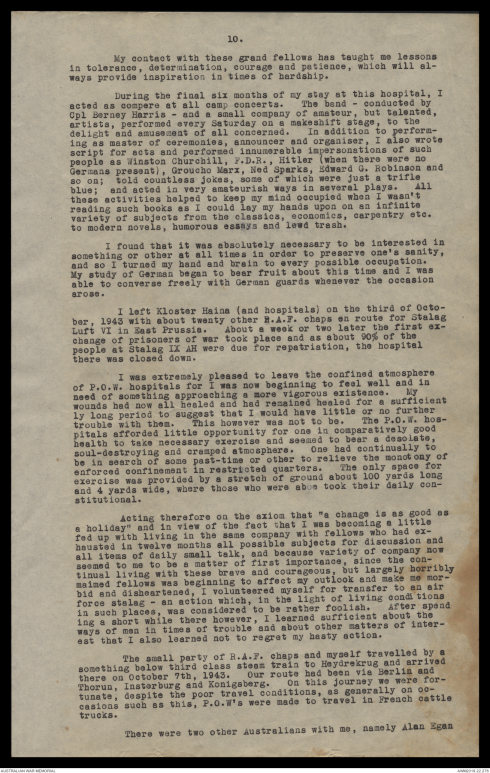
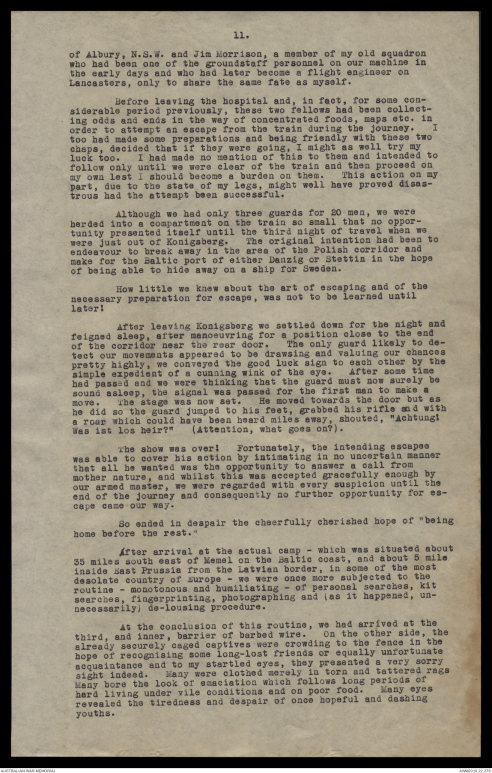
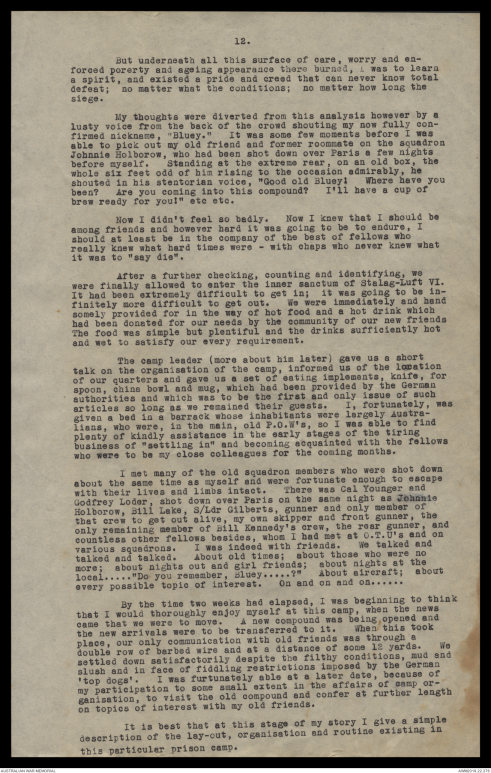
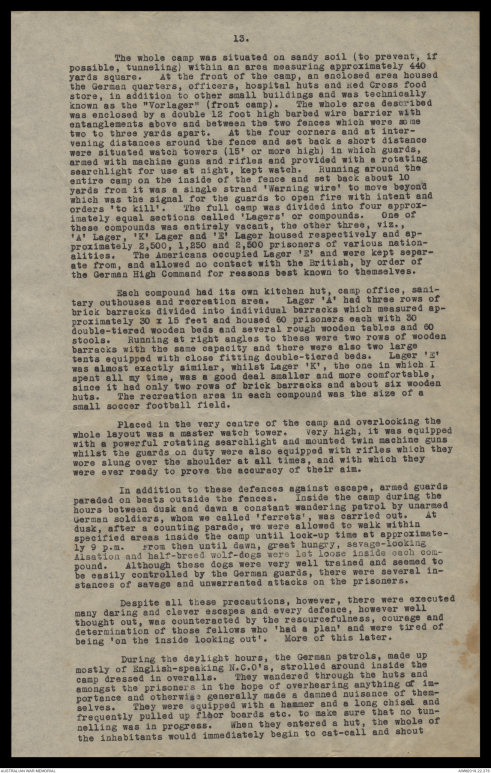
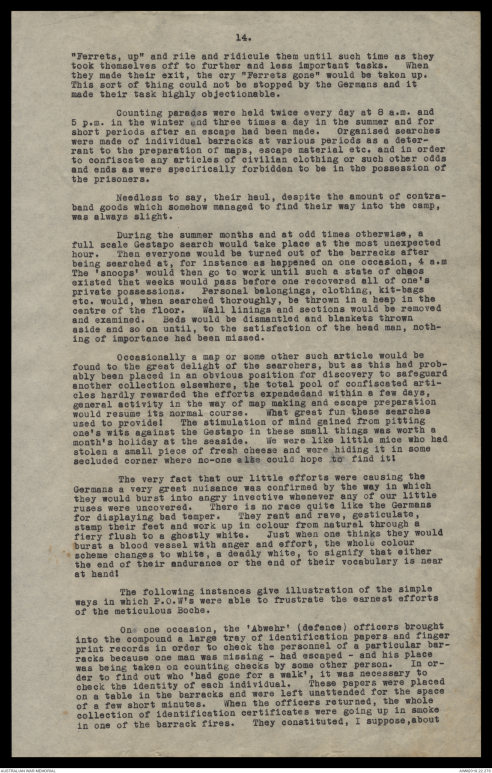
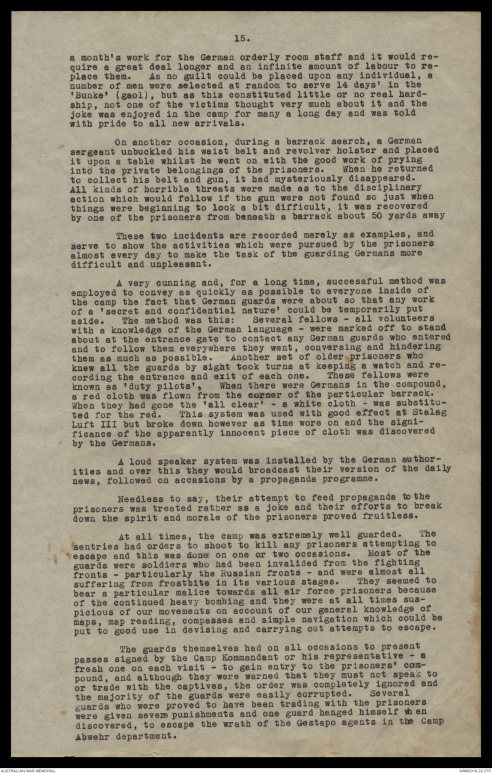
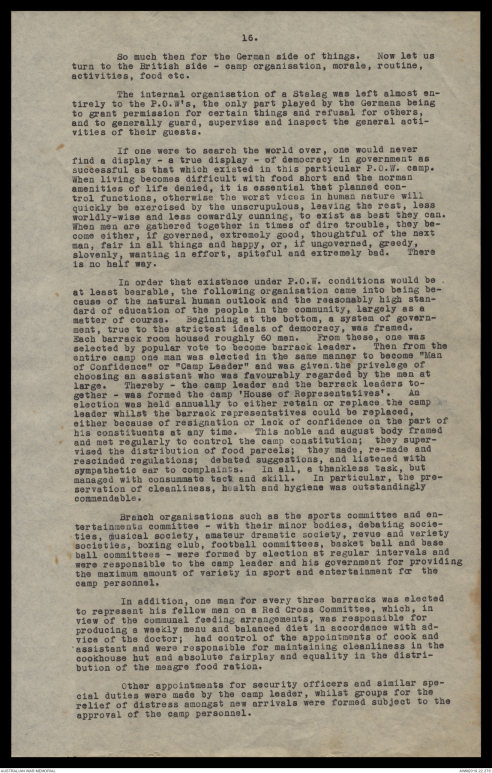
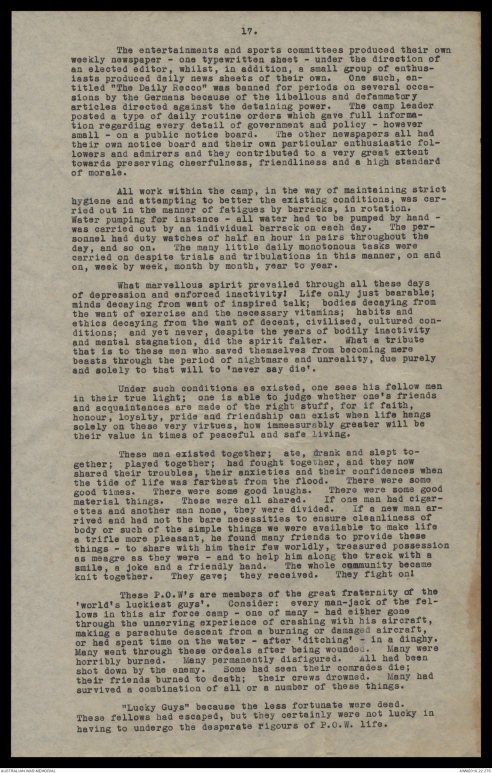
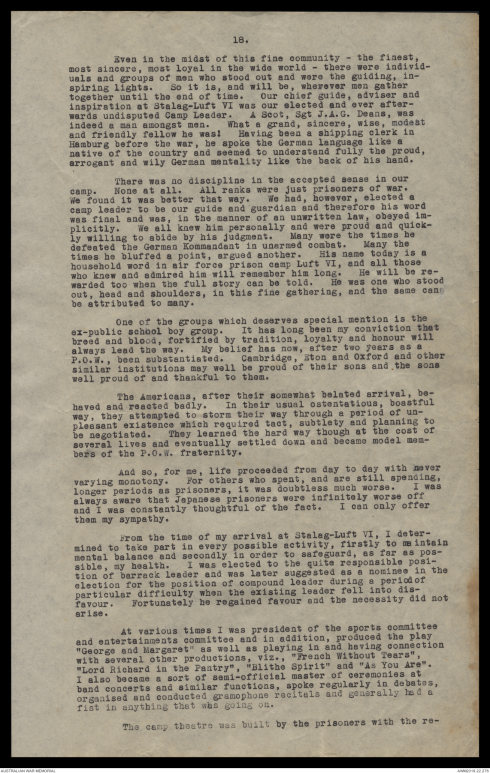
9.
By this time, I was able to hobble about with the aid of crutches
and walking stick and felt infinitely less miserable than
when I had to spend all my time in bed.
I was transferred from Wasungen at the beginning of October,
1942 to Stalag IX AH (Kloster Haina). This hospital was
staffed also by British doctors and medical orderlies and was made
up of ten large, three-storied buildings. It had been a German
insane asylum and one block of the hospital still housed a number
of violent mental cases. The P.O.W. section, which constituted
three of the blocks, was wired off and patrolled by a prison guard
In all, I spent 12 months, short by two days, in this place.
Most of the time it was pleasant enough but on one or two occasions,
the prisoners were treated very poorly by the Germans who
seemed to delight in imposing all kinds of humiliating and seemingly
unnecessary restrictions. Further, the supplies of Red
Cross food parcels were, on one or two occasions, interrupted due
to military operations and during these periods - though short -
living became mere existence. We were all glad during these
times to eat whatever scraps of food were available and were not
too proud to count such things as potato peelings, bread crusts
and other sundry items as part of our normal food rations. In
"Good Times" however, food was plentiful enough to satisfy everyone
and the general organisation of the hospital from a British
point of view was extremely good. The organisation was entirely
in the hands of the prisoners of war and apart from the weekly
inspection, counting parades - twice and sometimes three times
daily - etc., the Germans left us pretty much to ourselves. On
one occasion however, the hospital was subjected to a Gestapo
search and about 30 or 40 Germans, all of the rank of Sergeant
and above, went over the hospital with a fine-tooth comb. Apart
from one important document, however, nothing of importance was
lost to them.
After one or two other minor operations, I was able to discard
all aids to walking and consequently was able to take part in
such activities as went on. At different times I acted as a sort
of secretary to the British doctors and helped them to prepare case
histories of all patients. I re^ad books to the blind boys nightly
and took part in and conducted camp concerts; and was generally
able to fill in the monotonous, weary hours.
In all, there were about thirty to forty blinded P.O.W's
there and they were under the control and guidance of the Marquis
of Normandy, who was repatriated in 1943 with them when they went
home to England. A school was set up at the hospital to teach
these fellows such subjects as Braille, typewriting, maths, history,
economics, boot repairing etc, etc. They obtained musical
instruments through the Red Cross and Y.M.C.A. and organised a
blind boys' accordion band, which gave occasional concert performances;
and besides they were almost entirely dependent upon themselves
for amusement.
For a period of about six months from May, 1942 onwards, I
read to them the books of their choice - for two hours every week
night and for four hours every Sunday, and thereby formed a close
association with them all. They were the finest bunch of fellows
that I have met for cheerfulness and high spirits in adversity and
I shall cherish the memory of my link with them for the rest of my
life.
In addition to the blind fellows, about half of the 400
patients were one-legged army and air force chaps who hobbled
around on roughly made peg legs. Several fellows had both legs
amputated and the remainder were suffering from all varieties of
frightful and painful wounds received in battle. Yet, despite
these horrible, handicapping ailments, the spirits of the mass of
the fellows never at any time became low, and it was amazing to
see the way in which they put up with their disabilities in such a
cheerful manner in the face of difficulties, defeat, humiliation
and enforced restrictions.
10.
My contact with these great fellows has taught me lessons
in tolerance, determination, courage and patience, which will always
provide inspiration in times of hardship.
During the final six months of my stay at this hospital, I
acted as compere at all camp concerts. The band - conducted by
Cpl Berney Harris - and a small company of amateur, but talented,
artists, performed every Saturday on a makeshift stage, to the
delight and amusement of all concerned. In addition to performing
as master of ceremonies, announcer and organiser, I also wrote
scripts for acts and performed innumerable impersonations of such
people as Winston Churchill, F.D.R., Hitler (when there were no
Germans present). Groucho Marx, Ned Sparks, Edward G. Robinson and
so on; told countless jokes, some of which were just a trifle
blue; and acted in very amateurish ways in several plays. All
these activities helped to keep my mind occupied when I wasn't
reading such books as I could lay my hands upon on an infinite
variety of subjects from the classics, economics, carpentry etc.
to modern novels, humorous essays and lewd trash.
I found that it was absolutely necessary to be interested in
something or other at all times in order to preserve one's sanity,
and so I turned my hand and brain to every possible occupation.
My study of German began to bear fruit about this time and I was
able to converse freely with German guards whenever the occasion
arose.
I left Kloster Haina (and hospitals) on the third of October,
1943 with about twenty other R.A.F. chaps en route for Stalag
Luft VI in East Prussia. About a week or two later the first exchange
of prisoners of war took place and about 90% of the
people at Stalag IX AH were due for repatriation, the hospital
there was closed down.
I was extremely pleased to leave the confined atmosphere
of P.O.W. hospitals for I was now beginning to feel well and in
need of something approaching a more vigorous existence. My
wounds had now all healed and had remained healed for a sufficiently
long period to suggest that I would have little or no further
trouble with them. This however was not to be. The P.O.W. hospitals
afforded little opportunity for one in comparatively good
health to take necessary exercise and seemed to bear a desolate,
soul-destroying and cramped atmosphere. One had continually to
be in search of some past-time or other to relieve the monotony of
enforced confinement in restricted quarters. The only space for
exercise was provided by a stretch of ground about 100 yards long
and 4 yards wide, where those who were able took their daily constitutional.
Acting therefore on the axiom that "a change is as good as
a holiday" and in view of the fact that I was becoming a little
fed up with living in the same company with fellows who had exhausted
in twelve months all possible subjects for discussion and
all items of daily small talk, and because variety of company now
seemed to me to be a matter of first importance, since the continual
living with these brave and courageous, but largely horribly
maimed fellows was beginning to affect my outlook and make me morbid
and disheartened, I volunteered myself for transfer to an air
force stalag - and action which, in the light of living conditions
in such places, was considered to be rather foolish. After spending
a short while there however, I learned sufficient about the
ways of men in times of trouble and about other matters of interest
that I also learned not to regret my hasty action.
The small party of R.A.F. chaps and myself travelled by a
something below third class steam train to Heydrekrug and arrived
there on October 7th, 1943. Our route had been via Berlin and
Thorun, Insterburg and Konigsberg. On this journey we were fortunate,
despite the poor travel conditions, as generally on occasions
such as this, P.O.W's were made to travel in French cattle
trucks.
There were two other Australians with me, namely Alan Egan
11.
of Albury, N.S.W. and Jim Morrison, a member of my squadron
who had been one of the groundstaff personnel on our machine in
the early days and who had later become a flight engineer on
Lancasters, only to share the same fate as myself.
Before leaving the hospital and, in fact, for some considerable
period previously, these two fellows had been collecting
odds and ends in the way of concentrated foods, maps etc. in
order to attempt an escape from the train during the journey. I
too and made some preparations and being friendly with these two
chaps, decided that if they were going, I might as well try my
luck too. I had made no mention of this to them and intended to
follow only until we were clear of the train and then proceed on
my own lest I should become a burden on them. This action on my
part, due to the state of my legs, might well have proved disastrous
had the attempt been successful.
Although we had only three guards for 20 men, we were
herded into a compartment on the train so small that no opportunity
presented itself until the third night of travel when we
were just out of Konigsberg. The original intention had been to
endeavour to break away in the area of the Polish corridor and
make for the Baltic port of either Danzig or Stettin in the hope
of being able to hide away on a ship for Sweden.
How little we knew about the art of escaping and of the
necessary preparation for the escape, was not to be learned until
later!
After leaving Konigsberg we settled down for the night and
feigned sleep, after manoeuvring for a position close to the end
of the corridor near the rear door. The only guard likely to detect
our movements appeared to be drawsing and valuing our chances
pretty highly, we conveyed the good luck sign to each other by the
simple expedient of a cunning wink of the eye. After some time
had passed and we were thinking that the guard must now surely be
sound asleep, the signal was passed for the first man to make a
move. The stage was now set. He moved towards the door but as
he did so the guard jumped to his feet, grabbed his rifle and with
a roar which could have been heard miles away, shouted "Achtung!
Was ist los heir?" (Attention, what goes on?).
The show was over! Fortunately, the intending escapee
was able to cover his action by intimating in no uncertain manner
that all he wanted was the opportunity to answer the call from
mother nature, and whilst this was accepted gracefully enough by
our armed master, we were regarded with every suspicion until the
end of the journey and consequently no further opportunity for escape
came our way.
So ended in despair the cheerfully cherished hope of "being
home before the rest."
After arrival at the actual camp - which was situated about
35 miles south east of Memel on the Baltic coast, and about 5 mile
inside East Prussia from the Latvian border, in some of the most
desolate country of Europe - we were once more subjected to the
routine - monotonous and humiliating - of personal searches, kit
searches, fingerprinting, photographing and (as it happened, unnecessarily)
de-lousing procedure.
At the conclusion of this routine, we had arrived at the
third, and inner, barrier of barbed wire. On the other side, the
already securely caged captives were crowding to the fence in the
hope of recognising some long-lost friends or equally unfortunate
acquaintance and to my startled eyes, they presented a very sorry
sight indeed. Many were clothed merely in torn and tattered rags
Many bore the look of emaciation which follows long periods of
hard living under vile conditions and on poor food. Many eyes
revealed the tiredness and despair of once hopeful and dashing
youths.
12.
But underneath all this surface of care, worry and enforced
porerty and ageing appearance there burned, I was to learn
a spirit; and existed a pride and creed that can never know total
defeat; no matter what the conditions; no matter how long the
siege.
My thoughts were diverted from this analysis by a
lusty voice from the back of the crowd shouting my now fully confirmed
nickname, "Bluey." It was some moments before I was
able to pick out my old friend and former roommate on the squadron
Johnnie Holborow, who had been shot down over Paris a few nights
before myself. Standing at the extreme rear, on an old box, the
whole six feet odd of him rising to the occasion admirably, he
shouted in his stentorian voice, "Good Old Bluey! Where you have
been? Are you coming into the compound? I'll have a cup of
brew ready for you!" etc etc.
Now I didn't feel so badly. Now I knew I should be
among friends and however hard it was going to be to endure, I
should at least be in the company of the best fellows who
really knew what hard times were - with chaps who never knew what
it was to "say die".
After a further checking, counting and identifying, we
were finally allowed to enter the inner sanctum of Stalag-Luft VI.
It had been extremely difficult to get in; it was going to be infinitely
more difficult to get out. We were immediately and handsomely
provided for in the way of hot food and a hot drink which
had been donated for our needs by the community of our new friends
The food was simple but plentiful and the drinks sufficiently hot
and wet to satisfy our every requirement.
The camp leader (more about him later) gave us a short
talk on the organisation of the camp, informed us of the location
of our quarters and gave us a set of eating implements, knife, for
spoon, china bowl and mug, which had been provided by the German
authorities and which was to be the first and only issue of such
articles so long as we remained their guests. I, fortunately, was
given a bed in a barrack whose inhabitants were largely Australians,
who were, in the main, old P.O.W's, so I was able to find
plenty of kindly assistance in the early stages of the tiring
business of "settling in" and becoming acquainted with the fellows
who were to be my close colleagues for the coming months.
I met many of the old squadron members who were shot down
about the same time as myself and were fortunate enough to escape
with their lives and limbs intact. There was Cal Younger and
Godfrey Loder, shot down over Paris on the same night as Johnnie
Holborow, Bill Lake, S/Ldr Gilberts, gunner and only member of
that crew to get out alive, my own skipper and front gunner, the
only remaining member of Bill Kennedy's crew, the rear gunner, and
countless other fellows besides, whom I had met at O.T.U's and on
various squadrons. I was indeed with friends. We talked and
talked and talked. About old times; about those who were no
more; about nights out and girl friends; about nights at the
local. . . . . "Do you remember, Bluey. . . . .?" About aircraft; about
every possible topic of interest. On and on and on. . . . . .
By the time two weeks had elapsed, I was beginning to think
that I would thoroughly enjoy myself at this camp, when the news
came that we were to move. A new compound was being opened and
the new arrivals were to be transferred to it. When this took
place, our only communication with old friends was through a
double row of barbed wire and at a distance of some 12 yards. We
settled down satisfactorily despite the filthy conditions, mud and
slush in face of fiddling restrictions imposed by the German
'top dogs'. I was fortunately able at a later date, because of
my participation to small extent in the affairs of camp organisation,
to visit the old compound and confer at further length
on topics of interest with my old friends.
It is best that at this stage of my story I give a simple
description of the lay-out, organisation and routine existing in
this particular prison camp.
13.
The whole camp was situated on sandy soil (to prevent, if
possible, tunneling) within an area measuring approximately 440
yards square. At the front of the camp, an enclosed area housed
the German quarters, officers, hospital huts and Red Cross food
store, in addition to other small buildings and was technically
known as the " Vorlager" (front camp). The whole area described
was enclosed by a double 12 foot high barbed wire barrier with
entanglements above and between the two fences which were some
two to three yards apart. At the four corners and at intervening
distances around the fence and set back a short distance
were situated watch towers (15' or more high) in which guards,
armed with machine guns and rifles and provided with a rotating
searchlight for use at night, kept watch. Running around the
entire camp on the inside of the fence and set back about 10
yards from it was a single strand 'Warning wire' to move beyond
which was the signal for the guards to open fire with intent and
orders 'to kill'. The full camp was divided into four approximately
equal sections called 'Lagers' or compounds. One of
these compound was entirely vacant, the other three, viz.,
'A' Lager, 'K' Lager and 'E' Lager housed respectively and approximately
2,500, 1,250 and 2,500 prisoners of various nationalities.
The Americans occupied Lager 'E' and were kept separate
from, and allowed no contact with the British, by order of
the German High Command for reasons best known to themselves.
Each compound had its own kitchen hut, camp office, sanitary
outhouses and recreation area. Lager 'A' had three rows of
brick barracks divided into individual barracks which measured approximately
30 x 15 feet and housed 60 prisoners each with 30
double-tiered wooden beds and several rough wooden tables and 60
stools. Running at right angles to these were two rows of wooden
barracks with the same capacity and there were also two large
tents equipped with close fitting double-tiered beds. Lager 'E'
was almost exactly similar, whilst Lager 'K', the one in which I
spent all my time, was a good deal smaller and more comfortable,
since it had only two rows of brick barracks and about six wooden
huts. The recreation area in each compound was the size of a
small soccer football field.
Placed in the very centre of the camp and overlooking the
whole layout was a master watch tower. Very high, it was equipped
with a powerful rotating searchlight and mounted twin machine guns
whilst the guards on duty were also equipped with rifles which they
wore slung over the shoulder at all times, and with which they
were ever ready to prove the accuracy of their aim.
In addition to these defences against escape, armed guards
paraded on beats outside the fences. Inside the camp during the
hours between dusk and dawn a constant wandering patrol by unarmed
German soldiers, whom we called 'ferrets', was carried out. At
dusk, after a counting parade, we were allowed to walk within
specified areas inside the camp until lock-up time at approximately
9 p.m. From then until dawn, great hungry, savage-looking
Alsation and half-breed wolf-dogs were let loose inside each compound.
Although these dogs were very well trained and seemed to
be easily controlled by the German guards, there were several instances
of savage and unwarranted attacks on the prisoners.
Despite all these precautions, however, there were executed
many daring and clever escapes and every defence, however well
thought out, was counteracted by the resourcefulness, courage and
determination of those fellows who 'had a plan' and were tired of
being 'on the inside looking out'. More of this later.
During the daylight hours, the German patrols, made up
mostly of English-speaking N.C.O.'s, strolled around inside the
camp dressed in overalls. They wandered through the huts and
amongst the prisoners in the hope of overhearing anything of importance
and otherwise generally made a damned nuisance of themselves.
They were equipped with a hammer and a long chisel and
frequently pulled up floor boards etc. to make sure that no tunnelling
was in progress. When they entered a hut, the whole of
the inhabitants would immediately begin to cat-call and shout
14.
"Ferrets, up" and rile and ridicule them until such time as they
took themselves off to further and less important tasks. When
they made they exit, the cry "Ferrets gone" would be taken up.
This sort of thing could not be stopped by the Germans and it
made their task highly objectionable.
Counting parades were held twice every day at 8 a.m. and
5 p.m. in the winter and three times a day in the summer and for
short periods after as escape had been made. Organised searches
were made of individual barracks at various periods as a deterrant
to the preparation of maps, escape material etc. and in order
to confiscate any articles of civilian clothing or such other odds
and ends as were specially forbidden to be in the possession of
the prisoners.
Needless to say, their haul, despite the amount of contraband
goods which somehow managed to find their way intothe camp,
was always slight.
During the summer months and at odd times otherwise, a
full scale Gestapo search would take place at the most unexpected
hour. Then everyone would be turned out of the barracks after
being searched at, for instance as happened on one occasion, 4 a.m.
The 'snoops' would then go to work until such a state of chaos
existed that weeks would pass before one recovered all of one's
private possessions. Personal belongings, clothing, kit-bags
etc. would, when searched thoroughly, be thrown in a heap in the
centre of the floor. Wall linings and sections would be removed
and examined. Beds would be dismantled and blankets thrown
aside and so on until, to the satisfaction of the head man, nothing
of importance had been missed.
Occasionally a map or some other such article would be
found to the great delight of the searchers, but as this had probably
been places in an obvious position for discovery to safeguard
another collection elsewhere, the total pool of confiscated articles
hardly rewarded the efforts expendedand within a few days,
general activity in the way of map making and escape preparation
would resume its normal course. What great fun these searches
used to provide! The stimulation of mind gained from pitting
one's wits against the Gestapo in these small things was worth a
month's holiday at the seaside. We were like little mice who had
stolen a small piece of fresh cheese and were hiding it in some
secluded corner where no-one else could hope to find it!
The very fact that our little efforts were causing the
Germans a very great nuisance was confirmed by the way in which
they would burst into angry invective whenever any of our little
ruses were uncovered. There is no race quite like the Germans
for displaying bad temper. They rant and rave, gesticulate,
stamp their feet and work up in colour from natural through a
fiery flush to a ghostly white. Just when one thinks they would
burst a blood vessel with anger and effort, the whole colour
scheme changes to white, a deadly white. to signify that either
the end of their endurance or the end of their vocabulary is near
at hand!
The following instances give illustration of the simple
ways in which P.O.W.'s were able to frustrate the earnest efforts
of the meticulous Boche.
On one occasion, the 'Abwehr' (defence) officers brought
into the compound a large tray of identification papers and finger
print records in order to check the personnel of a particular barracks
because one man was missing - had escaped - and his place
was being taken on counting checks by some other person. In order
to find out who 'had gone for a walk', it was necessary to
check thr idntity o each individual. These papers were placed
on a table in the barracks and were left unattended for the space
of a few short minutes. When the officers returned, the whole
collection of identification certificates were going up in smoke
in one of the barrack fires. They constituted, I suppose, about
15.
a month's work for the German orderly room staff and it would require
a great deal longer and an infinite amount of labour to replace
them. As no guilt could be placed upon any individual, a
number of men were selected at random to serve 14 days' in the
"Bunke" (gaol), but as this constituted little or no real hardship,
not one of the victims thought very much about it and the
joke was enjoyed in the camp for many a long day and was told
with pride to all new arrivals.
On another occasion, during a barrack search, a German
sergeant unbuckled his waist belt and revolver holster and placed
it upon a table whilst he went on with the good work of prying
into the private belongings of the prisoners. When he returned
to collect his belt and gun, it had mysteriously disappeared.
All kinds of horrible threats were made as to the disciplinary
action which would follow if the gun were not found so just when
things were beginning to look a bit difficult, it was recovered
by one of the prisoners from beneath a barrack about 50 yards away
These two incidents are recorded merely as examples, and
serve to show the activities which were pursued by the prisoners
almost every day to make the task of the guarding Germans more
difficult and unpleasant.
A very cunning and, for a long time, successful method was
employed to convey as quickly as possible to everyone inside of
the camp the fact that German guards were about so that any work
of a 'secret and confidential nature' could be temporarily put
aside. The method was this: Several fellows - all volunteers
with a knowledge of the German language - were marked off the stand
about at the entrance gate to contact any German guards who entered
and to follow them everywhere they went, conversing and hindering
them as much as possible. Another set of older prisoners who
knew all the guards by sight took turns at keeping a watch and recording
the entrance and exit of each one. These fellows were
known as 'duty pilots', When there were Germans in the compound,
a red cloth was flown from the corner of the particular barrack.
When they had gone the 'all clear' - a white cloth - was substituted
for the red. This system was used with good effect at Stalag
Luft III but broke down however as time wore on and the significance
of the apparently innocent piece of cloth was discovered
by the Germans.
A loud speaker system was installed by the German authorities
and over this they would broadcast their version of the daily
news, followed on occasions by a propaganda programme.
Needless to say, their attempt to feed propaganda to the
prisoners was treated rather as a joke and their efforts to break
down the spirit and morale of the prisoners proved fruitless.
At all times, the camp was extremely well guarded. The
sentries had orders to shoot to kill any prisoners attempting to
escape and this was done on one or two occasions. Most of the
fronts - particularly the Russian fronts - and were almost all
suffering from frostbite in its various stages. They seemed to
bear a particular malice towards all air force prisoners because
of the continued heavy bombing and they were at all times suspicious
of our movements on account of our general knowledge of
maps, map reading, compasses and simple navigation which could be
put to good use in devising and carrying out attempts to escape.
The guards themselves had on all occasions to present
passes signed by the Camp Kommandant or his representative - a
fresh one on each visit - to gain entry to the prisoner's compound,
and although they were warned that they must not speak to
or trade with the captives, the order was completely ignored and
the majority of the guards were easily corrupted. Several
were given severe punishments and one guard hanged himself when
discovered, to escape the wrath of the Gestapo agents in the Camp
Abwehr department.
16.
So much then for the German side of things. Now let us
turn to the British side - camp organisation, morale, routine,
activities, food etc.
The internal organisation of a Stalag was left almost entirely
to the P.O.W's, the only part played by the Germans being
to grant permission for certain and refusal for others,
and to generally guard, supervise and inspect the general activities
of their guests.
If one were to search the world over, one would never
find a display - a true display - of democracy in government as
successful as that which existed in this particular P.O.W. camp.
When living becomes difficult with food short and the norman
amenities of life denied, it is essential that planned control
functions, otherwise the worst vices in human nature will
quickly be exercised by the unscrupulous, leaving the rest, less
worldly-wise and less cowardly cunning, to exist as best they can.
When men are gathered together in times of dire trouble, they become
either, if governed, extremely good, thoughtful of the next
man, fair in all things and happy, or, if ungoverned, greedy,
slovenly, wanting in effort, spiteful and extremely bad. There
is not half way.
In order that existence under P.O.W. conditions would be
at least bearable, the following organisation came into being because
of the natural human outlook and the reasonably high standard
of education of the people in the community, largely as a
matter of course. Beginning at the bottom, a system of government,
true to the strictest ideals of democracy, was framed.
Each barrack room housed roughly 60 men. From these, one was
selected by popular vote to become barrack leader. Then from the
entire camp one man was elected in the same manner to become "Man
of Confidence" or "Camp Leader" and was given the privilege of
choosing an assistant who was favourably regarded by the men at
large. Thereby - the camp leader and the barrack leaders together
- was formed the camp 'House of Representatives'. An
election was held annually to either retain or replace the camp
leader whilst the barrack representatives could be replaced,
either because of resignation or lack of confidence on the part of
his constituents at any time. This noble and august body framed
and met regularly to control the camp constitution; they supervised
the distribution of food parcels; they made, re-made and
rescinded regulations; debated suggestions, and listened with
sympathetic ear to complaints. In all, a thankless task, but
managed with consummate tact and skill. In particular, the preservation of cleanliness, health and hygiene was outstandingly
commendable.
Branch organisations such as the sports committee and entertainments
committee - with their minor bodies, debating societies,
musical society, amateur dramatic society, revue and variety
societies, boxing club, football committees, basket ball and base
ball committees - were formed by election at regular intervals and
were responsible to the camp leader and his government for providing
the maximum amount of variety in sport and entertainment for the
camp personnel.
In addition, one man for every three barracks was elected
to represent his fellow men on a Red Cross Committee, which, in
view of the communal feeding arrangements, was responsible for
producing a weekly menu and balanced diet in accordance with advice
of the doctor; had control of the appointments of cook and
assistant and were responsible for maintaining cleanliness in the
cookhouse hut and absolute fairplay and equality in the distribution
of the meagre food ration.
Other appointments for security officers and similar special
duties were made by the camp leader, whilst groups for the
relief of distress amongst new arrivals were formed subject to the
approval of the camp personnel.
17.
The entertainments and sports committees produced their own
weekly newspaper - one typewritten sheet - under the direction of
an elected editor, whilst, in addition, a small group of enthusiasts
produced daily news sheets of their own. One such, entitled
"The Daily Recco" was banned for periods on several occasions
by the Germans because of the libellous and defammatory
articles directed against the detaining power. The camp leader
posted a type of daily routine orders which gave full information
regarding every detail of government and policy - however
small - on a public notice board. The other newspapers all had
their own notice board and their own particular enthusiastic followers
and admirers and they contributed to a very great extent
towards preserving cheerfulness, friendliness and a high standard
of morale.
All work within the cam, in the way of maintaining strict
hygiene and attempting to better the existing conditions, was carried
out in the manner of fatigues by barracks, in rotation.
Water pumping for instance - all water had to be pumped by hand -
was carried out by an individual barrack on each day. The personnel
had duty watches of half an hour in pairs throughout the
day, and so on. The many little daily monotonous tasks were
carried on despite trials and tribulations in this manner, on and
on, week by week, month by month, year to year.
What marvellous spirit prevailed through all these days
of depression and enforced inactivity! Life only just bearable;
minds decaying from want of inspired talk; bodies decaying from
the want of exercise and the necessary vitamins; habits and
ethics decaying from the want of decent, civilised, culture conditions;
and yet never, despite the years of bodily inactivity
and mental stagnation, did the spirit falter. What a tribute
that is to these men who saved themselves from becoming mere
beasts through the period of nightmare and unreality, due purely
and solely to that will to 'never say die'.
Under such conditions as existed, one sees his fellow men
in their true light; one is able to judge whether one's friends
and acquaintances are made of the right stuff, for if faith,
honour, loyalty, pride and friendship can exist when life hangs
solely on these very virtues, how immeasurably greater will be
their value in times of peaceful and safe living.
These men existed together; ate, drank and slept together;
played together; had fought together, and they now
shared their troubles, their anxieties and their confidences when
the tide of life was farthest from the flood. There were some
good times. There were some good laughs. There were some good
material things. These were all shared. If one man had cigarettes
and another man none, they were divided. If a new man arrived
and had not the bare necessities to ensure cleanliness of
body or such of the simple things we were available to make life
a trifle more pleasant, he found many friends to provide these
things - to share with him their few worldly, treasured possession
as meagre as they were - and to help him along the track with a
smile, a joke and a friendly hand. The whole community became
knit together. They gave; they received. They fight on!
These P.O.W's are members of the great fraternity of the
'world's' luckiest guys'. Consider: every man-jack of the fellows
in this air force camp - one of many - had either gone
through the unnerving experience of crashing with his aircraft,
making a parachute descent from a burning or damaged aircraft,
or had spent time in the water - after 'ditching' - in a dinghy.
Many went through these ordeals after being wounded. Many were
horribly burned. Many permanently disfigured. All had been
shot down by the enemy. Some had seen their comrades die;
their friends burned to death; their crews drowned. Many had
survived a combination of all or a number of these things.
"Lucky Guys" because the less fortunate were dead.
These fellows had escaped, but they certainly were not lucky in
having to undergo the desperate rigours of P.O.W. life.
18.
Even in the midst of this fine community - the finest,
most sincere, most loyal in the wide world - there were individuals
and groups of men who stood out and were the guiding, inspiring
lights. So it is, and will be, whenever men gather
together until the end of time. Our chief guide, adviser and
inspiration at Stalag-Luft VI was our elected and ever afterwards
undisputed Camp Leader. A Scot, Sgt J.A.G. Deans, was
indeed a man amongst men. What a grand, sincere, wise, modest
and friendly fellow he was! Having been a shipping clerk in
Hamburg before the war, he spoke the German language like a
native of the country and seemed to understand fully the proud,
arrogant and wily German mentality like the back of his hand.
There was no discipline in the accepted sense in our
camp. None at all. All ranks were just prisoners of war.
We found it was better that way. We had, however, elected a
camp leader to be our guide and guardian and therefore his word
was final and was, in the manner of an unwritten law, obeyed implicitly.
We all knew him personally and were proud and quickly
willing to abide by his judgement. Many were the times he
defeated the German Kommandant in unarmed combat. Many the
times he bluffed a point, argued another. His name today is a
household word in air force prison camp Luft VI, and all those
who knew and admired him will remember him long. He will be rewarded
too when the full story can be told. He was one who stood
out, head and shoulders, in this fine gathering, and the same can
be attributed to many.
One of the groups which deserves special mention is the
ex-public school boy group. It has been my conviction that
breed and blood, fortified by tradition, loyalty and honour will
always lead the way. My belief has now, after two years as a
P.O.W., been substantiated. Cambridge, Eton and Oxford and other
similar institutions may well be proud of their sons and the sons
well proud of and thankful to them.
The Americans, after their somewhat belated arrival, behaved
and reacted badly. In their usual ostentatious, boastful
way, they attempted to storm their way through a period of unpleasant
existence which required tact, subtlety and planning to
be negotiated. They learned the hard way though at the cost of
several lives and eventually settled down and became model members
of the P.O.W. fraternity.
And so, for me, life proceeded from day to day with never
varying monotony. For others who spent, and are still spending,
longer periods as prisoners, it was doubtless much worse. I was
always aware that Japanese prisoners were infinitely worse off
and I was constantly thoughtful of the fact. I can only offer
them my sympathy.
From the time of my arrival at Stalag-Luft VI, I determined
to take part in every possible activity, firstly to maintain
mental balance and secondly in order to safeguard, as far as possible,
my health. I was elected to the quite responsible position
of barrack leader and was later suggested as a nominee in the
election for the position of compound leader during a period of
particular difficulty when the existing leader fell into disfavour.
Fortunately he regained favour and the necessity did not
arise.
At various times I have president of the sports committee
and entertainments committee and in addition, produced the play
"George and Margaret" as well as playing in and having connection
with several other productions, viz., "French Without Tears",
"Lord Richard in the Pantry", Blithe Spirit" and "As You Are".
I also became a sort of semi-official master of ceremonies at
band concerts and similar functions, spoke regularly in debates,
organised and conducted gramophone recitals and generally had a
fist in anything that was going on.
The camp theatre was built by the prisoners with the re-
 Sam scott
Sam scottThis transcription item is now locked to you for editing. To release the lock either Save your changes or Cancel.
This lock will be automatically released after 60 minutes of inactivity.